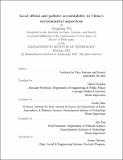Local official and polluter accountability in China's environmental inspections
Author(s)
Wu, Mengying
DownloadThesis PDF (2.233Mb)
Advisor
Karplus, Valerie
Selin, Noelle
Tsai, Lily
Terms of use
Metadata
Show full item recordAbstract
Poor environmental practices can lead to high levels of ambient air pollution that are detrimental to human health and cause premature death. Even if environmental regulations are well designed, incomplete implementation at the local level imposes substantial significant social costs. Although widely documented, solutions to inadequate enforcement have not been comprehensively studied. Using the context of China's environmental inspections, I examine which interventions effectively reduce air pollution in Chinese cities and close the enforcement gap. I am particularly interested in interventions that aim to alter the behavior of polluting company managers and local environmental bureaucrats.
In this thesis, I evaluate China's "new" hybrid approach, environmental inspections, that combines top-down scrutiny with bottom-up reporting. First, I investigate the dynamic responses of polluters to central scrutiny, which is a sharp, temporary increase in regulatory enforcement. Using data from China that links the intensity of environmental policing to high-frequency air pollution data, I show that crackdown over short (one-month) periods results in a sharp (35-39%) reduction in weekly average pollution around coal power plants. Pollution gradually reverts to prior levels after crackdowns end. The pace of reversion is faster for firms that outrank the city government, suggesting that hierarchical ties to China's central authorities limit a firm's accountability to the local environmental protection bureau.
Second, I present a full account of the citizen complaints received during the environmental inspection and evaluate the incremental effectiveness of the complaint channel on plant’s environmental performance. I build a novel data set that includes all complaint entries filed by citizens. I describe the frequency of complaints received by a wide range of polluters during the campaign, from small barbecue stalls to large aluminum smelters, suggesting that citizens focus on the most salient pollution sources in their immediate surroundings. Engaging citizen informants during crackdowns is not associated with larger pollution reductions but has no lasting effect, especially for the outranking firms. I further explore the effectiveness of such approach in a repeated version as the same program is conducted nationwide two years after the initial round. I find diminishing effects of top-down scrutiny as plants learn and update their beliefs on the seriousness of the campaign. However, direct central attention to these outranking firms during the lookback round may prolong the environmental inspection effect.
Third, I ask what drives citizen engagement in a central-initiated monitoring program in an authoritarian regime. I identify city and plant characteristics that predict the number of per capita complaints. Cities with poor environmental performance at the outset receive a greater number of complaints during both rounds of the environmental inspection. However, citizens can not identify and report egregious plants that polluted more in the baseline period. In addition, the willingness of citizens to file complaints is contingent on the environmental effectiveness of the original round. At the city level, the number of air-related complaints received per capita during the lookback round will decrease if measured air pollutants return to their baseline pollution levels following the conclusion of the original round.
This dissertation empirically documents the limits of China's highly centralized, state-led approach to improving environmental governance through enforcement crackdowns and engaging citizen complaints.
Date issued
2023-02Department
Massachusetts Institute of Technology. Institute for Data, Systems, and SocietyPublisher
Massachusetts Institute of Technology